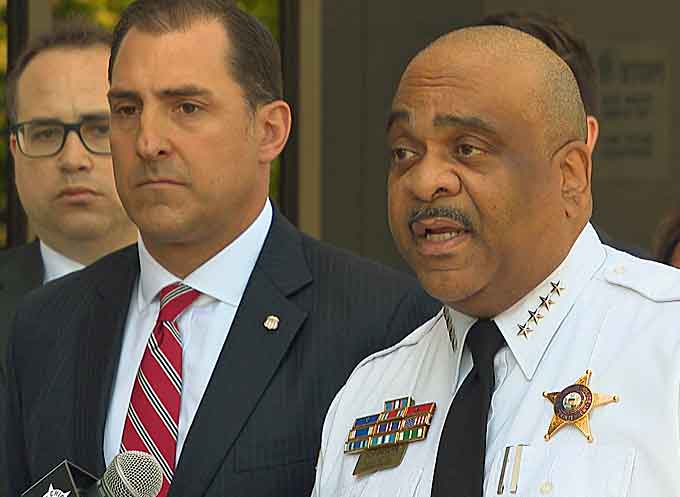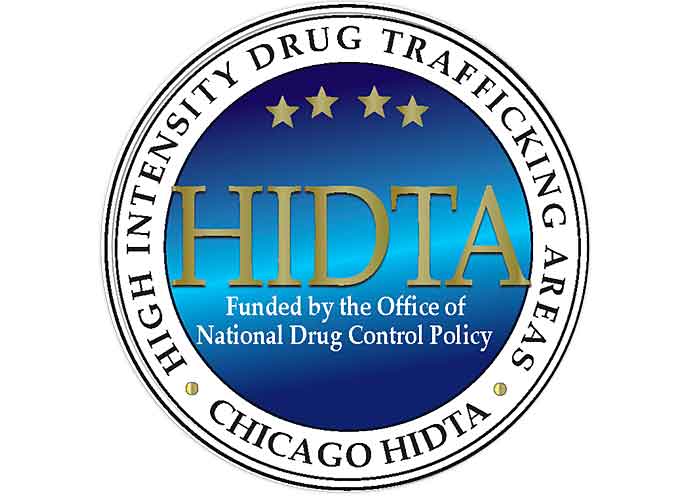
More than 50 individuals, including an alleged Mexico-based drug trafficker and a Wisconsin-based courier, are facing criminal charges as part of a joint federal and state investigation into heroin and fentanyl sales in Chicago.
The investigation, dubbed “Operation Full Circle,” centered on drug sales on the city’s West Side, and resulted in the seizure of more than two kilograms of heroin, a kilogram of fentanyl, and 300 pounds of marijuana.
Authorities also seized 17 illegal firearms, including three rifles, and approximately $8,000 in narcotics proceeds.
(More than 50 charged in Chicago heroin and Fentanyl ring. Hear from Eddie Johnson, Superintendent of the Chicago Police Department. Courtesy of MyStateline and YouTube. Posted on Jun 13, 2018.)
One of the defendants offered to kidnap a man who allegedly owed a debt to Mexico-based narcotics traffickers in exchange for cash and drugs.
The defendant was arrested and a search of his vehicle revealed two firearms, steel chains and duct tape.
Two other defendants engaged in a handgun-for-heroin transaction in December of last year, according to the federal charges.
The probe was conducted under the umbrella of the Organized Crime Drug Enforcement Task Force (OCDETF), in cooperation with the Chicago High Intensity Drug Trafficking Task Force (HIDTA).
(Learn More. The Organized Crime Drug Enforcement Task Forces (OCDETF) Program was established in 1982 to mount a comprehensive attack against organized drug traffickers. Today, the OCDETF Program is the centerpiece of the United States Attorney General’s drug strategy to reduce the availability of drugs by disrupting and dismantling major drug trafficking organizations and money laundering organizations and related criminal enterprises. Courtesy of WebsEdgeGovernment and YouTube. Posted on Oct 21, 2017)
OCDETF is a partnership between federal, state and local law enforcement agencies, whose principal mission is to identify, disrupt and dismantle the most serious drug trafficking organizations.
Criminal complaints and affidavits filed in U.S. District Court in Chicago charge seven defendants with various drug offenses, and two defendants with firearm offenses.
Several of the federal defendants were arrested Tuesday. Detention hearings for some of the federal defendants will be held on June 22, 2018, before U.S. Magistrate Judge Daniel G. Martin.
Forty-eight other defendants were charged in state complaints, and many of them were also arrested Tuesday.
They have begun making initial appearances in Cook County Criminal Court.
The charges were announced by the following law enforcement authorities:
- John R. Lausch, Jr., United States Attorney for the Northern District of Illinois
- Brian McKnight, Special Agent-in-Charge of the Chicago Field Division of the U.S. Drug Enforcement Administration (DEA)
- Celinez Nunez, Special Agent-in-Charge of the Chicago Field Division of the U.S. Bureau of Alcohol, Tobacco, Firearms and Explosives (ATF)
- Nicholas Roti, Director of HIDTA
- Kimberly M. Foxx, Cook County State’s Attorney
- Eddie Johnson, Superintendent of the Chicago Police Department, and
- Gabriel L. Grchan, Special Agent-in-Charge of the IRS Criminal Investigation Division in Chicago.
Substantial assistance was provided by HIDTA DEA Group 43, the U.S. Marshals Service, and the U.S. Postal Inspection Service in Chicago.
Assistant U.S. Attorneys John Mitchell and Grayson Walker are representing the government.
According to the federal complaints, Krzsztof Rak, 60, operates a drug trafficking organization in Mexico, and works with Christopher J. Doss, 47, of Racine, Wisc., to distribute wholesale quantities of fentanyl to customers in the Chicago area.
Donald Holmes, Sr., 56, of Chicago, and Ivan Walton, 45, of Lynwood, participated in the organization by regularly distributing Rak’s narcotics in the Chicago area and collecting payment from customers, according to the charges.
The federal complaints describe a meeting earlier this year between Doss and Walton in a restaurant parking lot in south suburban Matteson.
During the meeting, Doss supplied Walton with more than 880 grams of fentanyl, the charges allege. Law enforcement conducted surveillance of the transaction after securing court authorization to wiretap certain telephones.
In another narcotics transaction described in the federal complaints, Nakia McClinic, 43, of Chicago, attempted to deliver heroin and fentanyl to an individual who had received the drug order from Deshawn Moore, 24, of Bellwood.
Law enforcement was watching when McClinic arrived at the meeting in a parking lot near the University of Illinois at Chicago, the complaints state.
Officers attempted to pull over McClinic’s vehicle but he sped off, tossing the drugs out of the driver’s side window, the charges allege. McClinic’s vehicle was successfully stopped a short while later, and the narcotics were recovered nearby.
(Learn More. Chicago police and the feds say 57 people are facing charges in an investigation of a Mexican drug trafficker supplying heroin and fentanyl on the West Side. Courtesy of CBS Chicago and YouTube. Posted on Jun 13, 2018)


















